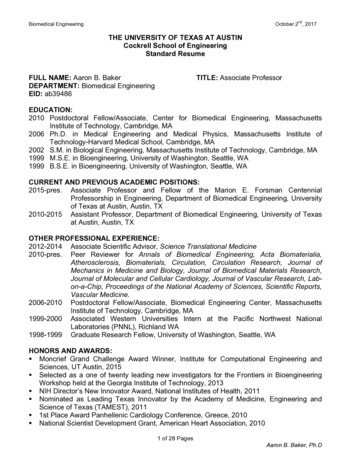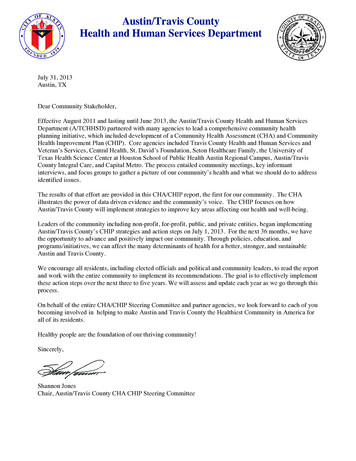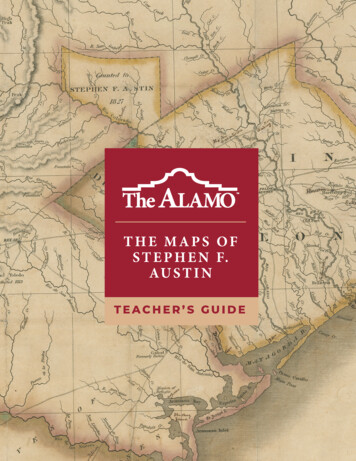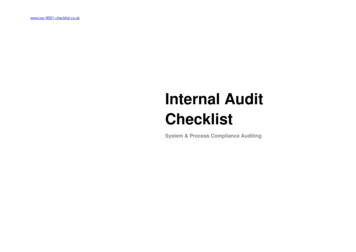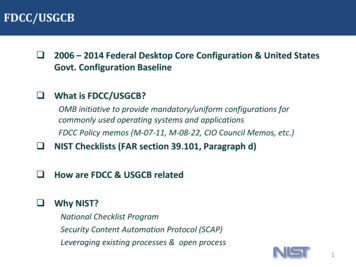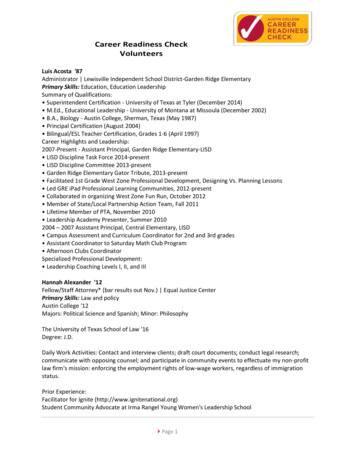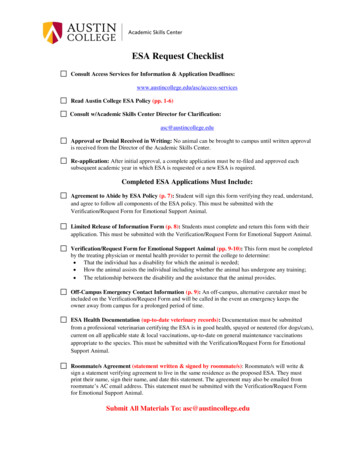
Transcription
ESA Request ChecklistConsult Access Services for Information & Application sRead Austin College ESA Policy (pp. 1-6)Consult w/Academic Skills Center Director for Clarification:asc@austincollege.eduApproval or Denial Received in Writing: No animal can be brought to campus until written approvalis received from the Director of the Academic Skills Center.Re-application: After initial approval, a complete application must be re-filed and approved eachsubsequent academic year in which ESA is requested or a new ESA is required.Completed ESA Applications Must Include:Agreement to Abide by ESA Policy (p. 7): Student will sign this form verifying they read, understand,and agree to follow all components of the ESA policy. This must be submitted with theVerification/Request Form for Emotional Support Animal.Limited Release of Information Form (p. 8): Students must complete and return this form with theirapplication. This must be submitted with the Verification/Request Form for Emotional Support Animal.Verification/Request Form for Emotional Support Animal (pp. 9-10): This form must be completedby the treating physician or mental health provider to permit the college to determine: That the individual has a disability for which the animal is needed; How the animal assists the individual including whether the animal has undergone any training; The relationship between the disability and the assistance that the animal provides.Off-Campus Emergency Contact Information (p. 9): An off-campus, alternative caretaker must beincluded on the Verification/Request Form and will be called in the event an emergency keeps theowner away from campus for a prolonged period of time.ESA Health Documentation (up-to-date veterinary records): Documentation must be submittedfrom a professional veterinarian certifying the ESA is in good health, spayed or neutered (for dogs/cats),current on all applicable state & local vaccinations, up-to-date on general maintenance vaccinationsappropriate to the species. This must be submitted with the Verification/Request Form for EmotionalSupport Animal.Roommate/s Agreement (statement written & signed by roommate/s): Roommate/s will write &sign a statement verifying agreement to live in the same residence as the proposed ESA. They mustprint their name, sign their name, and date this statement. The agreement may also be emailed fromroommate’s AC email address. This statement must be submitted with the Verification/Request Formfor Emotional Support Animal.Submit All Materials To: asc@austincollege.edu
Austin College Policy Regarding the Use of Animals for AccommodationIt is the policy of Austin College to provide equal access and reasonable accommodation for individuals withdisabilities to participate in any program, service, or opportunity provided by the campus; and to comply withSection 504 of the Rehabilitation Act, the Americans with Disabilities Act as amended by the ADA AmendmentsAct of 2008 (ADAAA), the Fair Housing Act, and other applicable federal and state regulations that prohibitdiscrimination on the basis of disability. Under the Fair Housing Act, persons with disabilities may request areasonable accommodation of an assistance animal, including an emotional support animal in housing when its useis necessary to afford a person with a disability an equal opportunity to use and enjoy a dwelling. With respect to arequest for an assistance or emotional support animal, Austin College will determine, on a case-by-case basis,whether such an animal is a reasonable accommodation on campus.Questions regarding service and emotional support animals should be directed to the Academic Skills CenterDirector in WCC 211, by phone at 903-813-2454, or by email at asc@austincollege.edu.Emotional Support Animal (ESA) DefinedAn emotional support animal (ESA) is an animal that provides comfort to an individual with a disability upon therecommendation of a healthcare or mental health professional. An emotional support animal does not assist a personwith a disability with activities of daily living, is not required to be trained to perform work or tasks, and does notaccompany a person with a disability at all times. ESAs can be species other than dogs. The role of an ESA is to livewith a student and alleviate the symptoms of an individual’s disability to provide equal opportunities to use andenjoy college housing. The revised 2010 ADA regulations specify that “the provision of emotional support wellbeing, comfort, or companionship do not constitute work or tasks,” so these animals are not considered serviceanimals.Conflicting DisabilitiesStudents who have allergic reactions to service dogs and/or emotional support animals (ESAs) that are substantialenough to qualify as a disability, must follow procedures to document a medical/physical disability and requestspecific accommodations related to such disability-related needs. Austin College will consider disability-relatedneeds of all parties involved, and explore reasonable accommodations and seek resolution as efficiently andexpeditiously as possible.Things to Consider When Contemplating an Emotional Support Animal as anAccommodation in College Housing1)2)3)4)5)6)7)8)Time obligation related to care of specific speciesTime away from the animal, student schedule, lifestyle, other responsibilitiesFinancial cost of food, supplies, veterinarian visitsPrevious ownership of species or anxiety an animal may experience in a new environmentCaring for the animal during school breaksTravelTraining of animal (housebroken or litter trained)Ideal time to bring it to campus1Documents adapted with permission from Texas Tech University, Humboldt State University, Arcata, CA, High Point University, High Point, NC,Syracuse University, Syracuse, NY, Oregon State University, Corvallis, OR, and DAISWEB.COM
Eligibility for Emotional Support Animals as an AccommodationA student requesting an emotional support animal (ESA) should identify with the Director of the Academic SkillsCenter as a qualified student with a disability (i.e., have a physical or mental impairment that substantially limits oneor more major life activities) and provide documentation explaining how the animal will be necessary to offer thestudent equal opportunity to use and enjoy Austin College residential housing not otherwise possible.A student is not permitted to live with an ESA until given written approval by the Director of the Academic SkillsCenter.An individual may request an emotional support animal as an accommodation in a campus residential facility if:1) The individual has a disability;2) The animal is necessary to afford the individual an equal opportunity to use and enjoy a dwelling; and3) There is an identifiable relationship between the disability and the assistance the animal provides.Procedures for Verifying Eligibility and Requesting an Emotional Support AnimalStudents must follow institutional policy and procedures regarding ESAs and submit a formal request for an ESAaccommodation by submitting all of the following documentation together: Agreement to Abide by ESA Policy (p. 7): A signed form verifying the student read, understands, andagrees to follow all components of the ESA policy. This must be submitted with the Verification/RequestForm for Emotional Support Animal (ESA). Limited Release of Information Form (p.8): Students must complete and return this form with theirapplication. This must be submitted with the Verification/Request Form for Emotional Support Animal(ESA). Verification/Request Form for Emotional Support Animal (pp. 9-10): This form must be completedby the treating physician or mental health provider to permit the college to determine: That the individual has a disability for which the animal is needed;How the animal assists the individual including whether the animal has undergone any training;The relationship between the disability and the assistance that the animal provides. Off-Campus Emergency Contact Information (p. 9): An off-campus, alternative caretaker must beincluded on the Verification/Request Form and will be called in the event of an emergency that keeps theowner away from campus for a prolonged period of time. The contact information of the alternativecaretaker will be filed with campus police. ESA Health Documentation (up to date veterinary records): Documentation must be submitted from aprofessional veterinarian certifying the ESA is in good health, spayed or neutered (for dogs/cats), currenton all applicable state and local vaccinations, up-to-date on general maintenance vaccinations appropriateto the species. ESA owners will provide updated vaccination documentation on an ongoing basis asnecessary. Applicable animals must wear a current rabies vaccination tag on campus. Roommate/s Agreement (statement written and signed by roommate/s): Roommate/s will write andsign a statement verifying agreement to live in the same residence as the proposed ESA. They must print2Documents adapted with permission from Texas Tech University, Humboldt State University, Arcata, CA, High Point University, High Point, NC,Syracuse University, Syracuse, NY, Oregon State University, Corvallis, OR, and DAISWEB.COM
their name, sign their name, and date this statement. The agreement may also be emailed from roommate’sAC email address. This statement must be submitted with the Verification /Request Form for EmotionalSupport Animal (ESA).Exclusion of Emotional Support Animals from Campus FacilitiesIn accordance with the Federal Housing Administration (FHA), Austin College allows ESAs only in residentialfacilities. Animals must comply with all City of Sherman Code of Ordinances regarding animals and the State ofTexas Health and Safety Code §822.101 (Animals defined as “Dangerous Wild Animals”).No animal will be permitted in residential facilities that:1) Is not approved through the Academic Skills Center’s Access Services program2) Poses a direct threat to the health or safety of others: A handler may be directed to remove an animal thatAustin College determines to be a substantial and direct threat to the health and safety of individuals. Thismay occur as a result of a very ill animal, or a substantial lack of cleanliness of the animal.3) Is out of control: If improper animal behavior happens repeatedly, the handler may be prohibited frombringing the animal into any campus facility until the handler can demonstrate that steps have been taken tomitigate the behavior. Improper behavior includes, but is not limited to, activity that may interfere with thequality of life of other residents on campus, such as barking or other disruptive noise.4) Is not housebroken: A handler may be directed to remove an animal that is not housebroken or litterboxtrained.5) Would cause substantial physical damage to the property of the college and other residents6) Would pose an undue financial and administrative burden to the college7) Would fundamentally alter the nature of the college’s housing operationsRemoval of AnimalAustin College may remove or require the removal of the ESA if it poses a threat to the health and safety of otherson campus, disrupts the educational environment of Austin College and/or the residential community, or the if theowner does not comply with the rules and responsibilities listed in this policy. It is the responsibility of the ESAowner to ensure the ESA does not interfere with the quality of life of other residents on campus. This includes noiseviolations (e.g. barking or other disruptive noise).Approval of Requests for Emotional Support AnimalsThe ADA Compliance Committee, consisting of the Vice President of Student Affairs, the Dean of Students, and theDirector of Academic Skills Center, will evaluate all documentation and issue a decision regarding the requestedESA. The Director of the Academic Skills Center will notify the student and the Student Life Office regardingapproval status. The committee reserves the right to request additional information, request a meeting with thestudent and/or recommend an alternate accommodation.After initial approval, a complete application must be re-filed and approved each subsequent year inwhich an ESA is requested or a new ESA is required.3Documents adapted with permission from Texas Tech University, Humboldt State University, Arcata, CA, High Point University, High Point, NC,Syracuse University, Syracuse, NY, Oregon State University, Corvallis, OR, and DAISWEB.COM
Denials of Requests for Emotional Support AnimalsAustin College is not required to provide accommodations that would pose a direct threat to the health or safety ofothers. Austin College will also deny requests that would: (1) result in substantial physical damage to the propertyof others; (2) pose an undue financial and administrative burden on the College; or (3) fundamentally alter the natureof the College’s residence life operations.Responsibilities and Requirements for Emotional Support Animals and Their HandlersTo maintain the safety and health of the Austin College community, requirements for ESAs and their owners includethe following:1)Animal and Owner Etiquette and Behavior:a. The ESA owner agrees to abide by all other residential policies. An exception to the animal policymade under this ESA Policy does not constitute an exception to any other Austin College policy.b. The owner must notify the Director of the Academic Skills Center if the ESA is no longer needed,or is no longer in the residential facilities. To replace a previously approved ESA, the owner mustcomplete and submit required documentation and forms to the Academic Skills Center.c. A copy of all required and up-to- date immunizations must be filed with the Academic Skills CenterDirector.d. Dogs and cats must be spayed or neutered. A copy of the veterinarian’s report must be filed withthe Academic Skills Center Director.e. The ESA owner is solely responsible for the animal’s well-being and cleaning, including but notlimited to regular feeding, bathing, grooming, daily care and veterinary services.f. Dogs as ESAs must be “housebroken” and cats as ESAs must be litterbox trained. An owner maybe required to remove an animal that is not housebroken.g. Collars and tags must be worn at all times.h. An ESA must be taken out of the building by way of the shortest and most direct path, and must bemaintained under standard restraints such as a carrier and/or collar and leash when outdoors, inpublic areas, or in transit and must be confined to the residence when not in transit.i. Animals which constitute a threat or nuisance to staff, residents or property, as determined byResidence Life staff must be removed within seven (7) days of notification. If the Austin CollegeCampus Police personnel determine an animal poses an immediate threat, animal control may besummoned to remove the animal. If the behavior of an animal can be addressed and changed by theowner so the animal does not have to be removed, then a written action plan must be submitted bythe owner. The action plan must outline the action to take place to alleviate the problems and alsomust give a deadline as to the length of time the plan will take to complete. Any action plan mustmeet the approval of the Dean of Student Life. Any animal owner found not adhering to a removaldirective will be subject to disciplinary action.2)Animal Supervision:a. The ESA must accompany the owner if the owner leaves campus for a prolonged period. The ESAmay not be left unattended overnight in the residential facilities to be cared for by another campusresident.4Documents adapted with permission from Texas Tech University, Humboldt State University, Arcata, CA, High Point University, High Point, NC,Syracuse University, Syracuse, NY, Oregon State University, Corvallis, OR, and DAISWEB.COM
b.c.d.e.The owner will be required to set up an off-campus, alternative caretaker for the ESA in the eventof an emergency that keeps the owner away from campus for a prolonged period of time. Thecontact information of the alternative caretaker will be filed with campus police.The designated off-campus emergency contact person indicated will retrieve the animal fromcampus if the owner is quarantined or isolated on campus for COVID-19 related symptoms.When ESAs are left unattended in a student’s room, they are required to be stored in a crate,carrier, kennel, or other appropriate enclosure. This containment will allow Austin Collegepersonnel to routinely access the residential facilities for maintenance and other routine taskswithout posing a risk to the animal or Austin College staff.The owner will hold Austin College blameless in the event the ESA goes missing. Austin Collegestaff are not responsible for the retrieval of the ESA in the event the animal escapes or becomeslost.3)Injury, Cleanup, Damage:a. The handler is responsible for any damage or injuries caused by their animal and must takeappropriate precautions to prevent property damage or injury.b. The handler is solely responsible for cleaning up after the ESA. If the handler is not physicallyable to clean up after the animal, it is the handler’s responsibility to hire someone to conduct thistask.c. Animal waste must be immediately disposed of properly by the owner. It is the owner’sresponsibility to dispose of litter box contents and any solid animal waste in a plastic bag, and thenplace that bag in the garbage dumpsters outside of the residence. Animal feces may not bedisposed of in any trash receptacle or through the sewer system inside any building on the AustinCollege campus.d. Residents with cats must properly maintain litter boxes. In consideration of health of the cat andoccupants of the residence, cat litter box contents must be disposed of properly and regularly.e. If living on campus with an ESA, the handler’s residence may be inspected for fleas, ticks, pests, and/orother damage as needed. The Student Life Office will schedule the inspection and notify the resident ofthe scheduled inspection. If fleas, ticks, or other pests are detected through inspection, the residence hallwill be treated in accordance with college pest control procedures. The handler will be billed for theexpense of any necessary pest control treatment.f. If living on campus with an ESA, the handler will be financially responsible for expenses incurredabove a standard cleaning or for repairs to the residential premises, including losses, liability, andclaims.4)Restricted Areas:a. The ESA will remain in the ESA owner’s assigned campus room and is not permitted in otherstudents’ rooms or the common areas of the residential facilities, or in other areas of AustinCollege such as classrooms, academic buildings, administrative buildings, libraries, diningservices areas, fitness center, etc.5Documents adapted with permission from Texas Tech University, Humboldt State University, Arcata, CA, High Point University, High Point, NC,Syracuse University, Syracuse, NY, Oregon State University, Corvallis, OR, and DAISWEB.COM
Penalties for Improper Use of Assistance AnimalsSection 121.006 of the Texas State Policy identifies penalties for improper use of Assistance Animals:1)A person who uses a service animal with a harness or leash of the type commonly used by persons withdisabilities who use trained animals, in order to represent that his or her animal is a specially trainedservice animal when training has not in fact been provided, is guilty of a misdemeanor and on convictionshall be punished by:a) a fine of not more than 300; andb) 30 hours of community service to be performed for a governmental entity or nonprofitorganization that primarily serves persons with visual impairments or other disabilities, or foranother entity or organization at the discretion of the court, to be completed in not more than oneyear.2)A person who habitually abuses or neglects to feed or otherwise neglects to properly care for his or herassistance animal is subject to seizure of the animal under Subchapter B, Chapter 821,Health and Safety Code.6Documents adapted with permission from Texas Tech University, Humboldt State University, Arcata, CA, High Point University, High Point, NC,Syracuse University, Syracuse, NY, Oregon State University, Corvallis, OR, and DAISWEB.COM
Agreement to Abide by ESA PolicyI have submitted a copy of my emotional support animal’s up-to-date veterinary health documentation, includingproof of immunization and spay/neuter record, to be kept on file in the Academic Skills Center. I have read thepolicy pertaining to emotional support animals and understand that I may be asked to remove my animal fromAustin College for non-compliance with policies and procedures outlined within.I understand it is my responsibility to communicate any relevant changes regarding my ESA agreement (i.e.,roommate change, room change, updates to vaccinations, etc.)I agree to have the emergency contact person I indicated to retrieve my animal from campus in the event of anemergency as outlined in this policy and in the policy updates on the Access Services webpage. I understand that myanimal must be removed from campus if I am quarantined or isolated on campus for COVID-19 related symptoms.I understand I will need to re-apply for an ESA each academic year and re-application paperwork will be acceptedthrough the last day of class day of each spring semester.Student Signature: Date:Director, Academic Skills Center: Date:7Documents adapted with permission from Texas Tech University, Humboldt State University, Arcata, CA, High Point University, High Point, NC,Syracuse University, Syracuse, NY, Oregon State University, Corvallis, OR, and DAISWEB.COM
LIMITED RELEASE OF INFORMATIONSTUDENT NAME DOBI, , hereby authorize AUSTIN COLLEGE ACADEMIC SKILLSCENTER to RECEIVE medical and/or mental health information and/or records regarding diagnosis andtreatment, for the College to determine whether student qualifies for an accommodation request.RELEASE TO/RECEIVE FROM(Name of Referring Medical Doctor, Therapist, Diagnostician, etc.)The information may be provided: 󠄀 󠄀 by phone 󠄀 by fax 󠄀󠄀 by mail 󠄀 by emailContact information of above named medical professional:󠄀 I understand that electronic mail (email) is not confidential and can be intercepted and read by other people.Information to be provided: 󠄀󠄀 Attendance/Dates of service 󠄀󠄀 Diagnosis󠄀 Treatment Summary󠄀󠄀 Treatment plan/goals󠄀 OtherIs there any medical and/or mental health information that you do not wish to be released?YesNoIf so, what? I understand that I have a right to receive a copy of this authorization.I understand that any cancellation, modification, or revocation of this authorization must be in writing.I understand that I have the right to revoke this authorization at any time unless Austin CollegeAcademic Skills Center has taken action in reliance upon it.I understand that it is my responsibility to confirm receipt by Austin College Academic Skills Center ofany cancellation, modification, or revocation.I further understand that information used or disclosed pursuant to this authorization may be subject tore-disclosure by the recipient and may no longer be protected by the HIPAA Privacy Rule, althoughapplicable Texas law may protect such information. In consideration of this consent, I hereby releasethe source of the records from all liability arising there-from.I, CONSENT to the release of information(Signature of student)(Date)EFFECTIVE TIME PERIOD. This authorization is valid for 1 year from the date signed unless another date isspecified below.Only complete this box if you wish to withdraw permission to release information.I, , wish to withdraw my consent to releaseinformation on .(Signature of student)8(Date)
VERIFICATION/REQUEST FORM FOR EMOTIONAL SUPPORT ANIMAL (ESA)Part I: To be completed by student:Student Name: Phone #:Proposed ESA Name: Type of Animal: Age of Animal:Residence Hall & Room #:Off-Campus Emergency Contact Name/Phone:(will care for the animal in case of emergency)I authorize Austin College to receive information from my provider named hereinI authorize my provider to discuss my condition(s) with appropriate and qualified Austin College personnel on an as-needed basis.Student Signature:Date:Attach additional paper if this space is not adequatePart II: To be completed by health care provider as described below:A licensed clinical professional/health care provider who fills out this form must be familiar with the history and functional limitations of theabove-named student.1Complete this form as thoroughly as possible so we may better evaluate the request for this accommodation. Austin Collegepersonnel will contact the above-named health care professional if more information is needed:How long have you treatedor counseled student?1.Date of initial contactwith student:Date of last office visitwith student:Specific disability/disorder (DSM-V), including when student was first diagnosed, severity, and current symptoms:2.Identify the specific limitations/impairment caused by the disability and how this substantially limits one or moremajor life activities for this student:91The2 42provider completing the form cannot be a relative of the student.U.S.C. § 3604(f)(3)(B)
3.Explain how the accommodation of an ESA is necessary for the individual to use and enjoy campus housing 2:4.Identify any other accommodations that may be effective in allowing use and enjoyment of housing. If applicable,indicate any mitigating measures that have been tried, or are currently being used, and how they alleviate oreliminate limitations:5.Have you discussed the responsibilities associated with properly caring for an animal while engaged in typicalcollege activities and residing in campus housing? Do you believe those responsibilities might exacerbate thestudent’s symptoms in any way?6.Has the proposed ESA undergone any specific training?7.Have you discussed with the student, the importance of reading and understanding the College policy on ESAs?Name of Treating Professional:License #:Address:Phone:Signature of Treating Professional: Date:Please Return Form to:Director, Academic Skills Center900 North Grand, Ste. 61544Sherman, TX 75090Office: (903) 813-2454Fax: (903) 813-2038Email: asc@austincollege.edu101The2 42provider completing the form cannot be a relative of the student.U.S.C. § 3604(f)(3)(B)
Read Austin College ESA Policy (pp. 1-6) Consult w/Academic Skills Center Director for Clarification: . Documents adapted with permission from Texas Tech University, Humboldt State University, Arcata, CA, High Point University, High Point, NC, Syracuse University, Syracuse, NY, Oregon State University, Corvallis, OR, and DAISWEB.COM .
